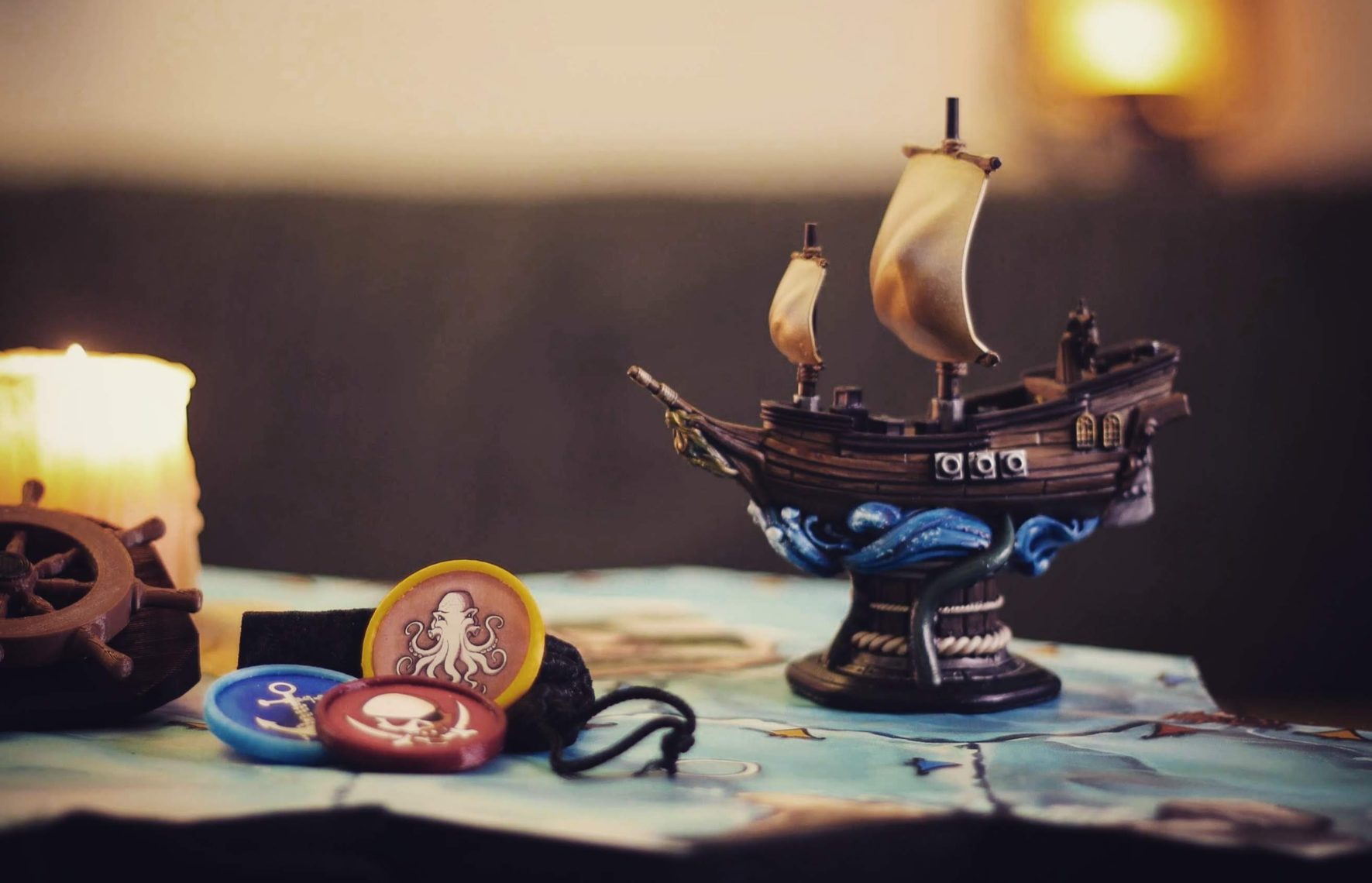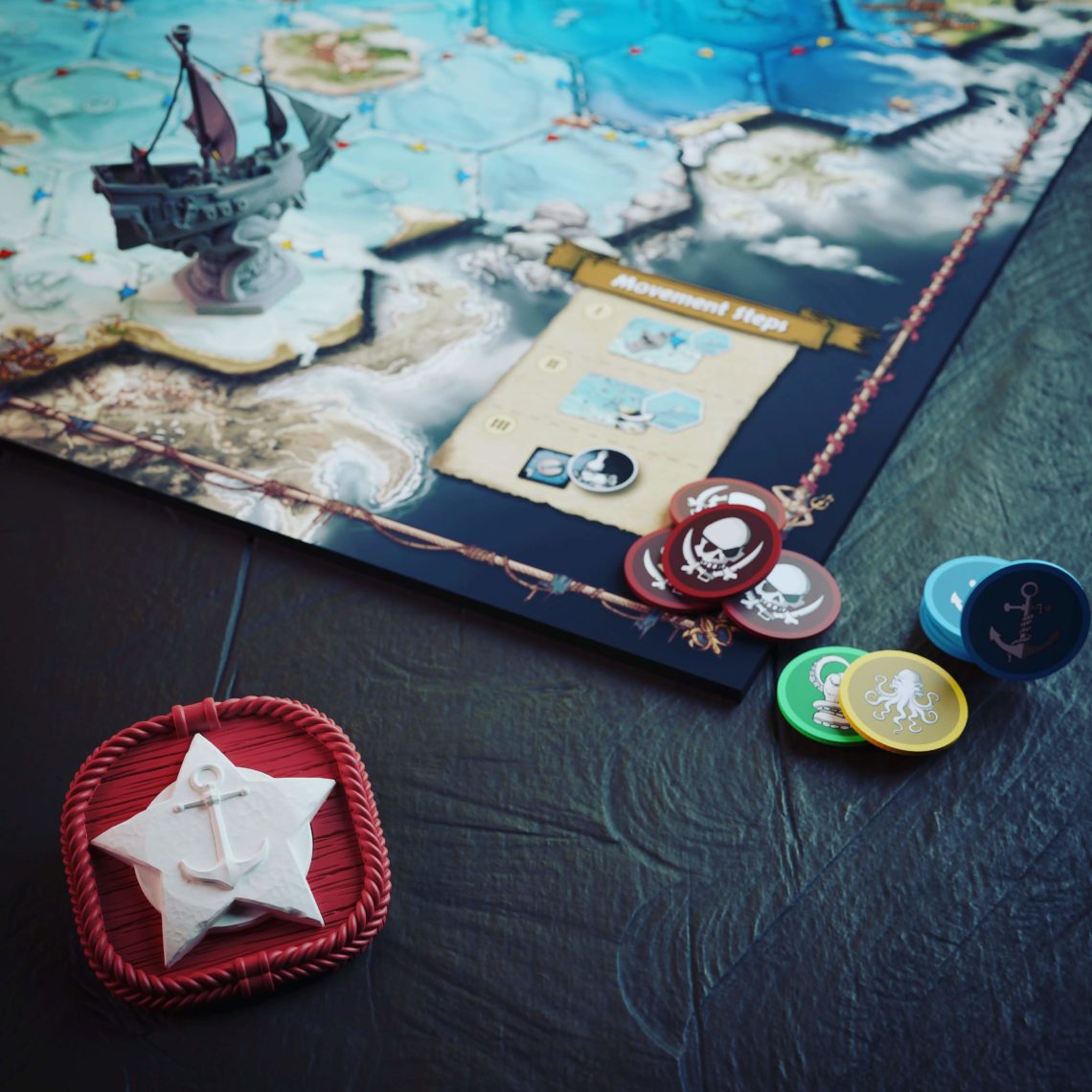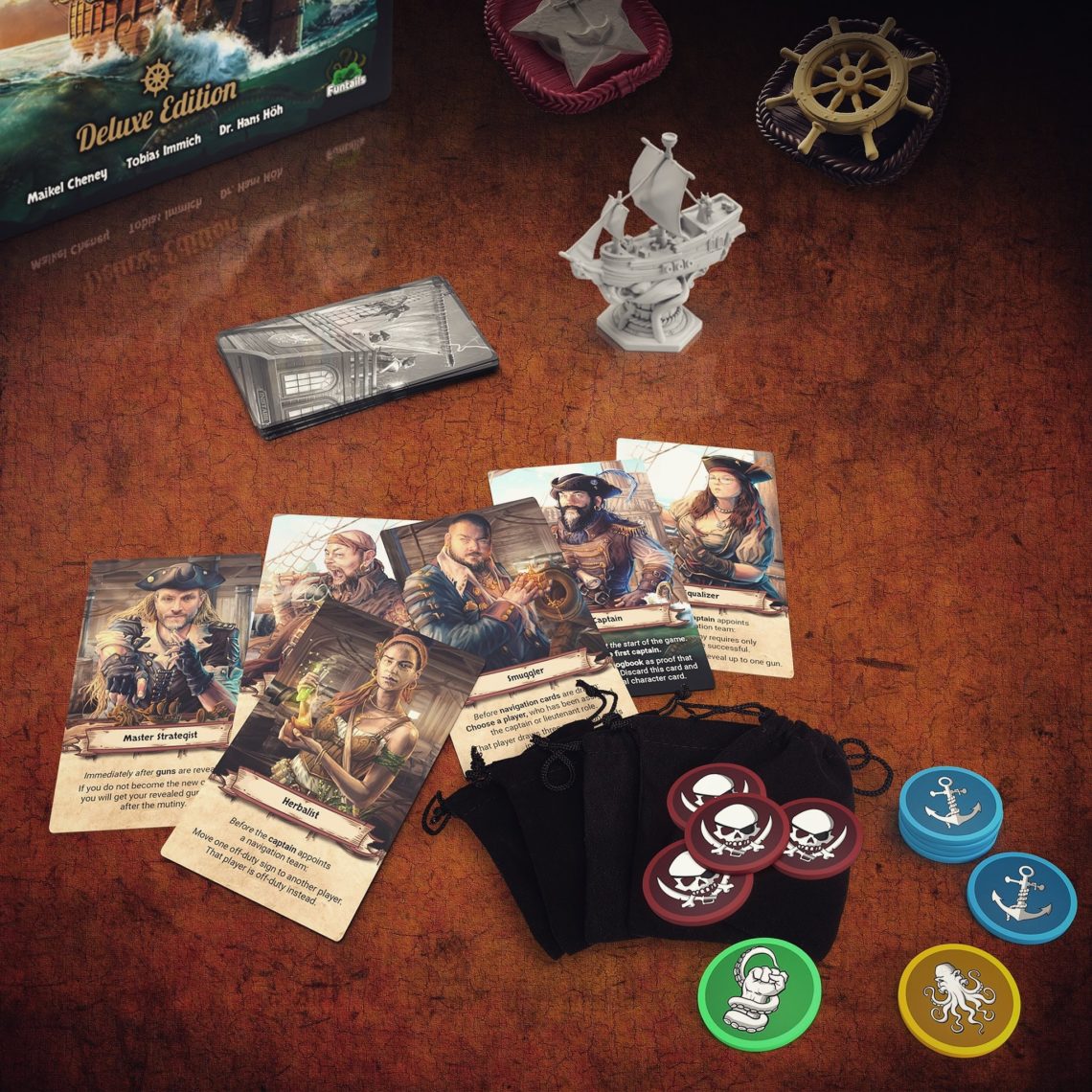If you have read anything I have written on this website before it is plainly obvious that I am a huge fan of social-deduction games. While there are many great social-deduction games out there I am always looking for something new in the genre. I recently watched a live playthrough of Feed the Kraken, which is designed by Dr. Hans Joachim Höh, Maikel Cheney and Tobias Immich, with art by Hendrik Noack and James Churchill. It is published by Funtails, which also published Glen More II to much acclaim.
In Feed the Kraken the players are part of one of three different factions: Sailors, Pirates and Cult. The players work together to sail the boat, with each team trying to direct the boat towards a final destination that will determine which team will win. I was so excited about the game that I reached out to the designers to talk about it. Dr. Hans Joachim Höh and Maikel Cheney were kind enough to answer some questions about the game. They also let me know that on Nov. 14-15 they are offering people the chance to get their portrait painted on one of the character cards in Feed the Kraken. Anyone who is interested should check out the Funtails Facebook or Instagram pages. Here is my interview with Hans and Maikel.
It seems pretty clear to me that those involved in designing the game are fans of social-deduction games. I am wondering which social-deduction games inspired the design of Feed the Kraken?
Maikel: All of them of course 🙂 Most of all I wanted to fill the gap between the rather quick Resistance / Avalon style games and the epic long Battlestar Galactica board game.
Hans: Yes, social deduction has become my favorite genre by far — after retiring from playing TCGs at the highest competitive levels. I consider my first game Götterdämmerung as an improved version of the Werewolf game engine. For SDveterans it is no secret upon which other social-deduction game engines Feed the Kraken is a great improvement upon.
What, if any, aspects of other social-deduction games did you actively try to avoid or fix?
Maikel: Well one important step was to design the mechanics to keep all players engaged during the whole game by reducing the time where individuals just watch as by-standers.But one major mechanic we enhanced is the voting system. Turning the usual system into a battle of resources by giving every player a limited amount of votes (in the form of guns) makes the voting much more strategic, intense and exciting. Also this gets rid of ‘failed vote trackers’ you might know from other games.
Hans: Another goal was to keep player elimination to the bare minimum and connect it to a special end-game event. Player elimination is done by the act of ‘feeding the Kraken’ — and this only happens a couple of minutes before the game ends. This way ‘dead’ players don’t have to wait too long before the next game starts.

Feed the Kraken seems to do a very good job of incorporating the theme into the game play. What inspired choosing the seafaring theme and which came first: the theme or the game mechanics?
Maikel: The theme actually came first. My initial idea was to have a travel-game for South East Asia. I just thought it would be super cool to have a pirate themed social-deduction game when exploring tropical islands.
Hans: The theme was already there, when I joined the team. I added a bunch of mechanics, but those were all inspired by the existing theme. My ideal for designing rules is that they should feel like natural extensions of the theme to players. Take our “Denial of Command” rule for example. The Navigator gets an order from the Captain And one from the Lieutenant. If they do not like either one, they can jump overboard — a thematically fitting rule to give players a small chance to help their team by removing themselves from the game instead if they would lose the game on the spot.
What made you decide to have both a double-sided board and how did that affect the game play design?
Maikel: During play-testing we felt the urge to design a board for a quicker game optimized for lower player counts. This resulted in the double-sided board featuring a ‘quick journey’ for new players and a ‘long journey’ with all cards and tokens for players who want to experience ‘all of it’. Due to a slightly different tile layout the ’long journey’ adds more room for deduction, bluffing and strategy.
Hans: We wanted the game to play perfectly with every supported player count. Creating two maps was one of the many things we did to fine-tune the gameplay for each player count.

In a similar vein, many social-deduction games are almost minimalist or barebones in terms of components. What made your team decide to opt for a big-box game with top-flight components?
Hans: When I met Maikel I had already published Götterdämmerung, which is a minimalist social-deduction game in regards to components. Götterdämmerung has more board presence than Werewolf, because all the cards sit on the table during gameplay, but I was ready to improve that even further. Feed the Kraken has a massive board presence able to draw in a spectator crowd when played in public or at conventions.
Maikel: I remember talking to Hans about my big-box vision at a board game convention in early 2019 where we displayed an early prototype of Feed the Kraken.I said that I wanted to have a deduction game that will fill your dining room table — a game you can ‘touch’ with lots of super cool components.At that time I was a bit disappointed, because I knew that many publishers wouldn’t jump onto this vision straight away. During 2019 we amplified the gameplay and sweetened the components.Then later in 2019 when Funtails first played Feed the Kraken they were irreversibly drawn into the hype. We immediately started planning the Kickstarter release for 2020.
What was the most interesting thing you learned about the game while you were play-testing it?
Maikel: When designing a social-deduction game like Feed the Kraken, you will really have to love the game with all passion you can spare — because you will be playtesting and promoting it for many thousand hours 😉 We had several very dedicated play-testing groups throughout Germany who just couldn’t get enough of the game!
Hans: Due to my decade of being a professional TCG player at the highest levels, I am working very differently than most game designers. I prefer to team up with highly creative game designers like Maikel, because I am not a primarily creative person, but a very analytic one. When I devise a new rule, I can predict the ripples it will cause on the game. Therefore I am rarely surprised by anything during playtesting. I was positively surprised by the fact that my play-testing groups demanded to play Feed the Kraken over and over again though.
Was there one thing you really tried to make work in the game’s design but had to drop for some reason or another?
Maikel: Metal Coins. In an early phase Tobias and I experimented with coins which were secretly passed from player to player. They added another level of resource management — but it didn’t incorporate well to the navigation process while making the gameflow much slower. We dropped the idea pretty quickly.
The game’s art by Hendrick Noack is very detailed and distinct. What inspired the look of the game?
Maikel: I was responsible for the main visual theme of the game and during the finalization I worked closely together with Hendrick Noack and Daniel Müller who amplified my vision. For me one key element was to set Feed the Kraken into a reallive possible history scenario. Without having too many fantasy or monster elements.To achieve the real-life attachment, we decided to portrait real people for all the character cards.Oh and of course Monkey Island and Cthulhu influenced the project as well 🙂 For anyone interested in more background news, we have started a small series where we talk about the art of Feed the Kraken (the first episode can be found here: https://www.youtube.com/watch?v=bVRFlvLAjUU).

Once Feed the Kraken is completed and delivered, what is next for you guys? Expansion for Feed the Kraken? Another social-deduction game? Something completely different?
Hans: As a designer I have a very nice push-your-luck game coming out early next year with Kosmos. In my role as chief editor at Funtails there are a few games on my plate for next year, ranging from classic Euro games all the way to family deduction games. We have already tossed around ideas how to expand the world of Feed the Kraken with expansions or entirely new games as well, and I would be happy to do so in the future.
Feed the Kraken is currently on Kickstarter at https://www.kickstarter.com/projects/funtails/feed-the-kraken, until Wed., Nov 18 at 2 p.m. EST, with an estimated delivery of July 2021. It works with 5-11 players over 45-90 minutes.
Comments
No comments yet! Be the first!